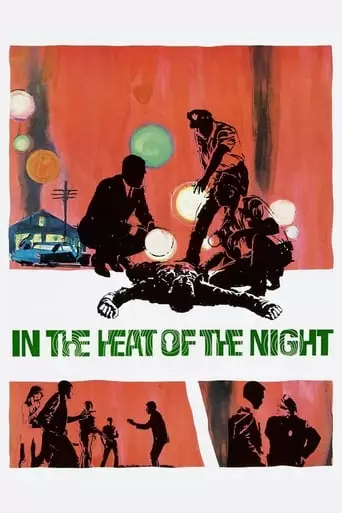African-American Philadelphia police detective Virgil Tibbs is arrested on suspicion of murder by Bill Gillespie, the racist police chief of tiny Sparta, Mississippi. After Tibbs proves not only his own innocence but that of another man, he joins forces with Gillespie to track down the real killer. Their investigation takes them through every social level of the town, with Tibbs making enemies as well as unlikely friends as he hunts for the truth.
In the Heat of the Night (1967) is a groundbreaking film set in the racially charged climate of the American South during the 1960s. Directed by Norman Jewison and based on John Ball’s novel, the film centers on Virgil Tibbs (Sidney Poitier), an African-American homicide detective from Philadelphia who is wrongly arrested in the small town of Sparta, Mississippi, after a wealthy industrialist is murdered. The local sheriff, Bill Gillespie (Rod Steiger), is initially skeptical of Tibbs’ credentials but eventually agrees to team up with him to solve the case. The film explores the tense dynamics between the two men, as well as the broader themes of racism, justice, and personal transformation.
Plot Overview:
Virgil Tibbs is passing through Sparta when he is arrested for the murder of Colbert, a prominent local businessman. The arrest is based purely on racial prejudice, with the town’s law enforcement assuming that a black man in the area must be guilty. Tibbs, however, is a respected police officer and soon proves his innocence. Recognizing his skills, Sheriff Gillespie reluctantly enlists Tibbs to help solve the crime. As they work together, they face numerous obstacles, including the hostile attitudes of the townspeople and the murder victim’s family. Tibbs and Gillespie’s evolving relationship forms the heart of the film, moving from suspicion and animosity to mutual respect.
Themes:
- Racism and Prejudice: The film highlights the pervasive racial discrimination in the South, both in the justice system and in everyday life. Tibbs is constantly confronted with hostility and racism, which underscores the difficulties of seeking justice in such an environment. His intelligence and competence are initially dismissed simply because of his race, but over time, his abilities force the town to confront its prejudices.
- Justice and Moral Integrity: Justice is a central theme, as both Tibbs and Gillespie are forced to navigate the complexities of law enforcement in a racially divided society. Tibbs represents the ideal of justice—he is a skilled, professional detective, but his efforts are continually undermined by societal prejudice. The film asks whether true justice can be served in such a deeply divided place.
- Personal Growth and Transformation: The relationship between Tibbs and Gillespie is symbolic of the potential for change. Gillespie begins as a staunch racist but evolves over the course of the investigation, coming to respect Tibbs not just for his intelligence but for his humanity. Tibbs, too, faces the challenge of reconciling his pride and professionalism with the blatant hostility around him.
10 Reasons to Watch In the Heat of the Night:
- Sidney Poitier’s Performance: Poitier’s portrayal of Virgil Tibbs is both powerful and dignified. He brings a sense of gravitas to a role that had never before been filled by a black actor in such a prominent, professional position.
- Rod Steiger’s Oscar-winning Role: Steiger’s performance as the bigoted Sheriff Gillespie earned him an Academy Award for Best Actor. His nuanced portrayal of a man who gradually changes is compelling and memorable.
- Cultural and Historical Relevance: The film provides a stark look at the civil rights struggles of the 1960s and remains relevant for understanding racial dynamics today.
- Tense Atmosphere: The film builds suspense not only through its murder mystery plot but also through the simmering racial tension, making it a gripping watch.
- Memorable Quotes: Poitier’s iconic line, “They call me Mister Tibbs!” has become part of cinematic history, symbolizing his character’s dignity and defiance.
- Top-notch Direction: Norman Jewison’s direction ensures that the film doesn’t just tackle racial issues head-on but also delivers a suspenseful and entertaining mystery.
- The Cinematography: Haskell Wexler’s cinematography beautifully captures the mood of the small-town South, adding to the film’s sense of isolation and tension
- Social Commentary: Beyond being a crime drama, the film is an incisive commentary on the challenges of race relations in America, forcing viewers to examine their own biases.
- Impact on Hollywood: It was one of the first major films to depict a black detective solving a crime, challenging racial stereotypes in film.
- Critical Acclaim: The film received five Academy Awards and was nominated for several others, cementing its place as one of the most significant films of the 1960s.
What Will You Feel After Watching?
In the Heat of the Night is a powerful and thought-provoking film. After watching, you will likely feel a mixture of frustration, empathy, and hope. The frustrations stem from the painful portrayal of the entrenched racism that Tibbs faces throughout the film, while the growing respect between Tibbs and Gillespie offers a sense of optimism for change. The film’s resolution, though somewhat subdued in its murder mystery elements, is deeply satisfying in its exploration of human dignity and transformation.
Ultimately, In the Heat of the Night is a film that will leave you reflecting on the complexities of justice, the impact of prejudice, and the potential for change. It’s a compelling watch that remains relevant in discussions about race and equality, making it not just a classic film but a crucial piece of American cinematic history.

